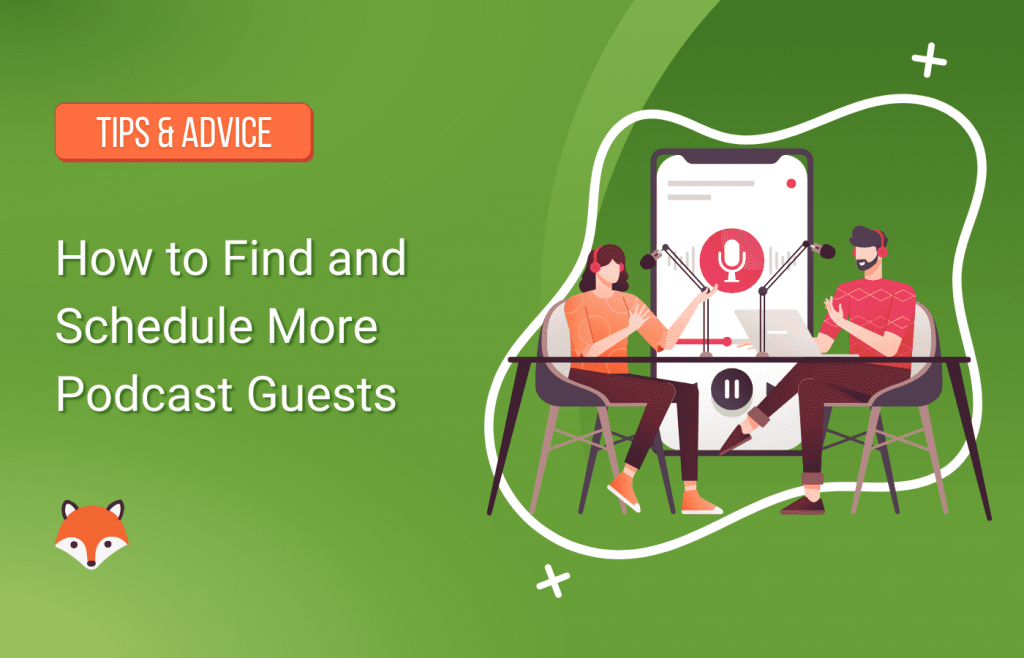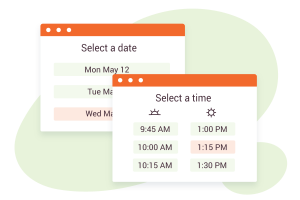Podcast guests won’t chase you down to get on your show (until you’re a big hit, of course), so you’ll need to take proactive steps to find podcast guests and schedule them on your own.
Like many people who want to start a podcast, you probably want to interview guests.
The right guest can boost the quality of your podcast content, help you build a community around your show, and even help you earn some money.
With that said, let’s explore how you can book more talks.
9 Resources to Find Podcast Guests
There’s no right or wrong way to find a podcast guest. You just have to keep your eye out for people who could add value to your show.
Here’s a list of the best resources.
- Look for blog or article authors in your topic space or that you find interesting.
- Find Mastermind communities; these could be Reddit communities, private Slack workspaces, etc.
- Hire someone to book guests for you and to help you find matches
- Ask your past guests if they have more topics they can talk about or if they know anyone who would be interested
- Engage on Social Media – Find people using hashtags or groups on Twitter, LinkedIn, or Facebook
- Look for book authors on Amazon – Sort by “Coming Soon”!
- Listen to other podcasts and propose collaborations or reach out to their guests.
- Connect through your website, make yourself findable and show people how to work with you
- Network daily – visit local events, conventions, meetups, interact on Twitter or Slack groups, etc.
We’re going to cover each resource in detail below. We hope these can spark some new ideas and motivate you to find podcast guests!
1. Look for Blog/Article Authors on Your Topic Space
Consider inviting the author to your show if you read a great article in your niche/topic. Prioritize the authors who already have their own followings so they can promote your show, but invite anyone who can add value to an episode.
If you have difficulty keeping track of your favorite authors or want to find new ones, use Feedly to discover new content and organize your reading. Create feeds based on categories and publications to study potential guests.
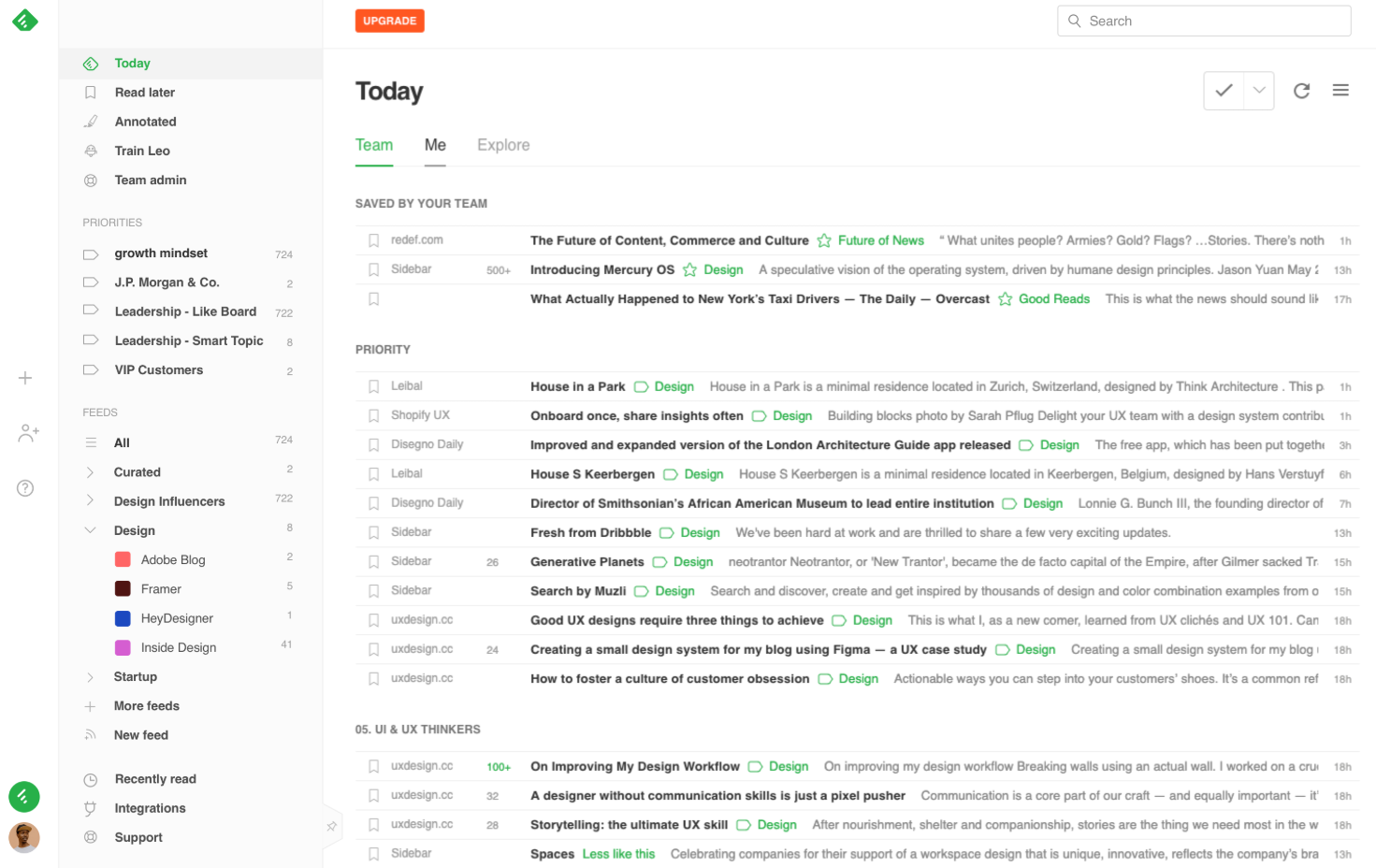
It also helps to create Google Alerts for any potential guest you’re researching. Once you create an alert, Google will notify you when something new that includes that person’s name pops up on the web.
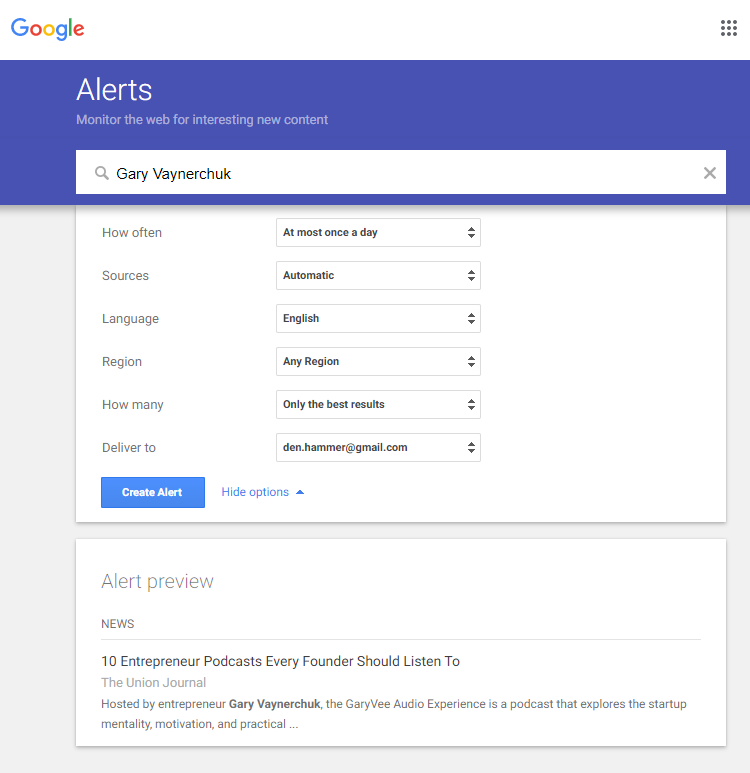
2. Find Podcast Guests through Mastermind Communities Online
Mastermind communities are great places to find podcast guests because they tend to collect experts on a niche topic in one place. No matter the niche, there’s a mastermind for it somewhere. They may not let you join (unless you’re an expert on the same subject), but you can ask an administrator to tell the group that you’re looking for a guest.
Some great places to find these communities is on:
- Reddit – they have one for just about anything you can think of. Try to look for people in the comments of threads that seem to pop up a lot and have a history of contributing to the forums.
- Slack Workspaces – people all across the globe have started to use Slack as a way to come together with like-minded folks to share questions and insights. The trick is to find them and join via a group member or an admin. A quick search on Reddit brings up a couple of helpful threads.
- Facebook Groups – search for the topic you’re interested in on Facebook, and you’re bound to find at least one existing group. These can be private or public, but it’s typically easy to get into Private groups via the group’s custom form.
3. Hire Podcast Booking Agencies
A guest booking service will find podcast guests on your behalf if you’re willing to invest a little money. They act like your agent. In many cases, they also represent the guests who want to be interviewed on podcasts.
There are a lot of podcast booking agencies out there that work directly with people who want to be featured on podcasts. You can get in touch with them and let them know you’re looking for guests. They’ll likely look through their directory of contacts and match you with someone.
4. Ask Your Past Guests
Your past guests are great sources of future guests because they probably know other people in your niche and can recommend someone who fits your format and style. When you follow up to thank a guest after the show, ask if they can refer you to anyone else who might want to do an episode with you.
Or, you can also reach out to your past guests and ask whether they have any other topics they’d like to speak about – maybe they’re about to launch a new book or website and want to share it with your audience.
Email template to ask for podcast referrals:
Hello there!
I wanted to follow up with you and let you know I had a wonderful time with you on the podcast. You're a pleasure to have and all my listeners are going to have a blast listening to the show.
If you ever want to be a guest again on the show, I would love to have you. Feel free to let me know if you have more topics to share or if you launch a new project in the future.
I would also like to ask if you know of anyone who would be interested in joining me for a show? I would love to talk with more like-minded individuals like yourself :)
Cheers!5. Engage in Social Media
Your social media profiles are some of your most powerful assets. They are key tools to promote your show, engage your audience, and even search for guests. Take your social media marketing seriously, even if your show isn’t popular yet.
Here are some basic ways to find podcast guests on social media.
- Follow key influencers in your niche/topic and have organic conversations.
- Post that you’re looking for guests on every platform you use.
- Ask friends to introduce you to people who would make great guests.
- Create a Twitter list with potential podcast guests and reach out to them when they start promoting something. (This is when they’ll be receptive to guest appearances.)
- Research companies you like on LinkedIn and reach out to people who work there.
- Look at people publishing articles on your topic on LinkedIn Pulse.
- Link, comment, and share potential guests’ content to get your name on their radar.
- Search for hashtags that relate to your niche and see who’s producing the best content.
- Look for YouTube videos by articulate hosts who know your niche/topic.
- Join a bunch of Facebook groups and look out for commenters who demonstrate they have experience.
6. Look for Authors on Amazon
Authors promoting their books always make great guests. They typically have a lot to say, and they want exposure. Look for upcoming books in your niche on Amazon and reach out to those authors.
One trick is to sort the books on Amazon by “Coming Soon” and then filter by the Department you’re interested in.
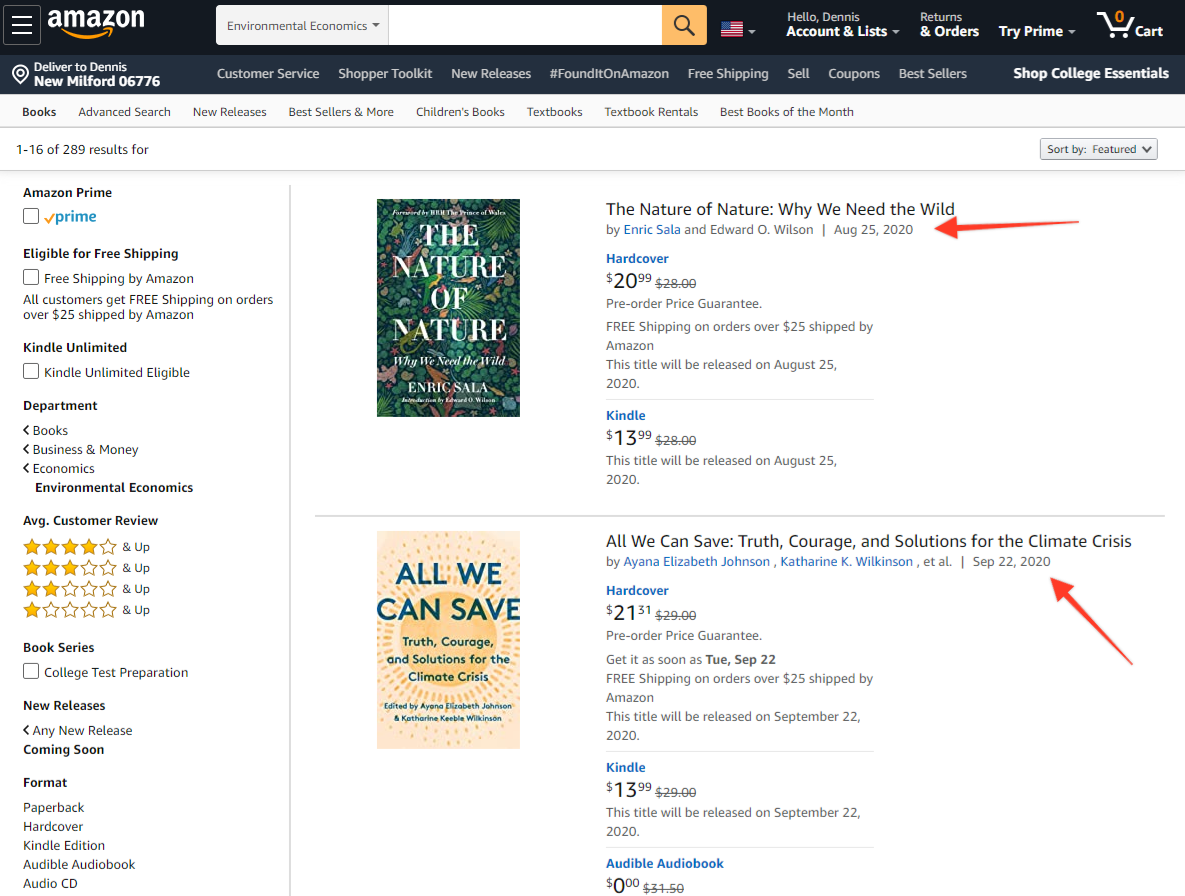
7. Listen to Other Podcasts
You probably listen to plenty of podcasts for your own enjoyment and education. If you hear someone who would make a great guest on your show, reach out to them with a pitch. They’ll be receptive because they already know how it works.
Or even consider collaborating with other Podcast hosts. They join you for an episode, and you join them for one.
Search the different platforms and keep an eye out for other podcasts that are up-and-coming and cover similar topics:
8. Connect Through Your Website
It’s important to have some instructions on your website for potential guests to find you. This is the first place they’ll look if they want to get on your show. Create a page just for potential guests that explain everything they need to know about working with you. Including a contact form or booking form for them to fill out.
It’s also helpful to include information about exactly who you’re looking for and your main topics. For example, instead of saying, “I’m a podcast host,” you should say, “I’m a podcast host for people who are interested in everything about coffee and love to try new things with me.”
9. Network Every Day
This is a bit of a catch-all category, but it’s important to remember. Keep your eye out for potential podcast guests at all times, even when you’re booked for a while. Attend events and let everyone know that you have an interview-style podcast. Make sure to hand out your business card to anyone interested in what you do. You never know where you’ll find your next guest!
Some networking opportunities to keep in mind:
- Local meetups
- Conventions and festivals – for example, Comic-con or SXSW
- Community events – search your local newspaper or your city’s Facebook group
- Follow people on Twitter with similar interests and interact with their threads or put out engaging content that stirs up discussion
How to Ask Someone to Be On Your Podcast (With Email Template)
Once you find podcast guests that pique your interest, you’ll need to reach out to them with an invite. How do you craft an invite? There are a few easy steps.
Step 1: Research Your Potential Podcast Guest Before Sending an Invite
First, it’s important to know your potential podcast guests well before you send a pitch.
Explore their podcast, blog, and social media content, keeping an eye out for anything related to your plan topic. Make sure your audiences overlap, have interesting things to say, and are right for your show overall.
Step 2: Write an Enticing Subject Line
Your subject line is the doorway to your pitch, so it has to be good. Your potential guest could ignore your email if your subject is boring. Make your subject line intriguing. Try to match your target’s values.
- Bad subject line: “Please come on my podcast.”
- Good subject line: “Let’s help stay-at-home moms build home businesses.”
Step 3: Write Your Body Copy for the Podcast Invitation
Depending on the popularity of your potential guest, they may get dozens of requests every day, so yours has to be unique, exciting, and compelling to get their attention.
Do not send a generalized pitch to every potential guest. Those are easy to spot and no one likes receiving them. It’s okay to use some stock copy, but be sure to customize it to the recipient. (Yes, this is more work, but generic pitches don’t get responses.)
Keep your pitch brief. It’s rarely helpful to send long essays packed with information. Here are the main details you need to get across:
- Who you are
- Why you’re contacting them
- What you can offer (the benefit to them)
- What you might talk about
- Where you’ll repurpose your podcast
- Samples of episodes to help them learn about your podcast
- What you’ll need from them (e.g., 25 minutes over Skype)
Your pitch should help your potential guest understand what’s in it for them. What value can you offer? Unless you can pay them for their time, the best you can offer is exposure, so make sure to drop some facts, like the size of your email list, the number of downloads you get, and the names of any well-known podcast guests you’ve had on your show before.
Give them an easy call to action at the end of the pitch. This should be a clear and simple step you want them to take. For instance, instead of asking them to commit to a recording date, ask them for a 10-minute phone call. You could send your email with something as simple as this: “If you’d like to go forward to hear more, just reply with ‘yes.’”
Podcast Guest Invitation Template
Not sure how to start? Use this pitch template as a starting point. Don’t forget to change the details!
Hey Mark,
Congrats on the launch of your new course! I already see people saying a lot of positive things about it on Twitter.
My name is Frank from the Growth Through Facebook podcast. We help small businesses use Facebook’s targeting features to grow their local businesses. We’ve only been around for a year, but we already get 10,000 listens per episode. We were mentioned on several top Facebook marketing blogs: [link], [link], and [link].
Your Facebook ads expertise would be a perfect match for our show. Our listeners would love to hear your thoughts about building audience personas (but we’re open to your ideas too). All we need is 30-minutes of your time to record over Zoom.
Before, during, and after the episode, we will promote your blog and course to our email list of 5,500 addresses and our social media audience of 23,000. We also repurpose the episode on YouTube and post clips on social media.
If you’re interested, I’d love to have a 10-minute chat with you about the episode and our format. Just click this link and pick any time that works for you. Thanks for your time!
[calendar link]
Respectfully,
Frank Jones
Bonus Tip: Follow Up on Your Podcast Guest Invite
If you don’t get a response to your pitch, send a follow-up email about a week later. If your potential guest is busy, they may need a quick reminder. Here’s a simple copy for your follow-up:
Hi [name], I’m just following up with my last email. I’d love to have you on my podcast. Let me know if we can work together. Thanks!If they don’t reply to your follow-up, try reaching out differently, like through Twitter or their website’s contact form. If you still can’t get through, move on to another potential guest.
FAQ for Getting Podcast Guests
Now let’s go over some of the questions that you’re probably thinking about at this point.
Do podcast guests get paid?
Podcast guests are generally not paid to make their appearances on podcast shows. Mostly because it’s common sense to both sides that the collaboration will be mutually beneficial. But, there can be exceptions – especially if the guest is in high demand, is an expert in their domain, or if their appearance can be seen as exclusive. In these cases, the guest’s manager may ask to settle on a payment.
With that said, podcast hosts may still extend some tokens of gratitude to their guests. Whether that be podcast merchandise, goodie bags with gift cards, or a small payment. It’s up to your budget and the circumstances of the collaboration.
Either way, making this part clear at the beginning of your interactions is recommended so there aren’t any miscommunication issues.
Do podcasts need guests?
Nope, not at all! How you run your podcast and what you decide to air is completely up to you. Guest and interview podcasting may be a popular format, but it’s certainly not the only way to conduct a podcast. Other podcast formats could be solo or co-hosted, focused on storytelling, presentations, or Q&As.
How to Easily Schedule Podcast Guests using WordPress
Simply Schedule Appointments is an online booking form for WordPress sites that helps you manage your podcast interviews. Your potential guests can book their meeting time without conflicting with your other show times or personal schedule.
Using a booking form on your website gives your prospects:
- A time and date to meet with you (for a pre-interview or the episode recording).
- An automatic calendar invitation with a link for them to join your meeting.
- Reminders and notifications to ensure they attend the meeting.
Summary
As you can see, finding and scheduling podcast guests is fairly straightforward, but it takes a little bit of work. You’ll find that your guest-hunting will quickly streamline finding opportunities whenever you read or watch content, have conversations, or surf the web. And as your show grows, eventually, quality guests will hunt for you. Good luck!
How do you find podcast guests? Do you use a booking system to streamline your process?

